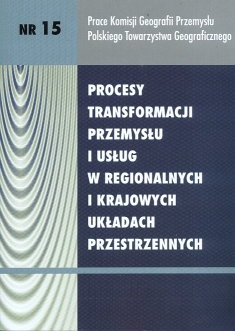Proces kształtowania potencjału innowacyjnego przedsiębiorstw z grupy MŚP w sektorze konstrukcji stalowych w warunkach konkurencji na rynku Unii Europejskiej
DOI:
https://doi.org/10.24917/20801653.15.7Słowa kluczowe:
innowacje, przedsiębiorstw, MŚP, konstrukcje staloweAbstrakt
The SMEs companies form the biggest part of all companies carrying out production in the Polish economic reality. The changes in enterprises, such as faster initiation of innovations or new technical, technological, and organization solutions, etc. were involved in the development and competitiveness of these companies and competitiveness of the whole branch - and in the same way, in the whole economy at the time of integration with the EU economy and globalization. Then, the knowledge about reasons and dynamics and structure of innovative changes in enterprises will provide the possibility to show the groups of factors involved in the innovative process, which is important for the enterprises and for the branch.
The presentation of innovative potential as definitions and measurement was based on the research of a group of SMEs, consisting of Polish and foreign enterprises. The main goal of the research was to explain the reason for FDI in the Polish branch of steel constructions and the influence of FDI on innovativeness of the Polish SMEs.
The obtained results allowed to define the factors with high influence coefficient for innovative potential in steel construction branch as inside and outside values, the readiness to realize the innovative activity, and skills of effective realization of all parts of the innovative process and knowledge absorption. In conditions of competitiveness on the EU market - where dynamic changes of quantity of participants and increase in the expectation of clients are observed - there are clearly growing meanings of the innovative process. In the present time of EU integration, there are quite new, additional factors in Polish SMEs, such as skills in building the relation between SMEs and abilities to create nets and clusters, and readiness for many different and changing forms of cooperation and growth at the level of knowledge.
Downloads
Metrics
Bibliografia
Antoszkiewicz A.D., 2008, Innowacje w firmie, praktyczne metody wprowadzania zmian, POLTEXT, Warszawa
Balcerowicz E., 2009, Mikroprzedsiębiorstwa w Polsce na tle Unii Europejskiej, [w:] A. Żołnierski (red.), Raport o stanie sektora małych i średnich przedsiębiorstw w Polsce w latach 2007–2008, PARP, Warszawa
Białoń L., Janczewska D., 2004, Bezpośrednie Inwestycje Zagraniczne w Polsce – marketingowe metody oceny z perspektywy sektora, WSM SIG, Warszawa
Białoń L., Janczewska D., 2009, Uwarunkowania strategii innowacji w organizacjach, Postępy Techniki Przetwórstwa Spożywczego – Technological Progress in Food Processing, No 1, Tom 19/34
Bieliński J. (red.), 2005, Konkurencyjność przedsiębiorstw w świetle Strategii Lizbońskiej, CeDeWu, Warszawa
Innovation in Denmark 2007–2010, 2006, Danish Agency of Technology and Innovation, Denmark
Sosnowska A., Łobejko S., Kłopotek A., 2000, Zarządzanie firmą innowacyjną, Difin, Warszawa
To increase the innovative potential of SMEs, 2005, Commission Officials, EU Report, Brussels
Viturka M., 2004, Innovative Potential Regional Evaluation in the Czech Republic, Masaryk University, Praha
Wojnicka E., Klimczak P., 2006, Stan sektora MŚP w 2004 roku, tendencje rozwojowe w latach 1994–2004, PARP, Warszawa
Żołnierski A., 2009, Raport o stanie sektora małych i średnich przedsiębiorstw w Polsce w latach 2007–2008, PARP, Warszawa
Pobrania
Opublikowane
Jak cytować
Numer
Dział
Licencja
Artykuły publikowane są zgodnie z warunkami licencji Creative Commons (CC BY-ND 4.0; uznanie autorstwa-bez utworów zależnych).

